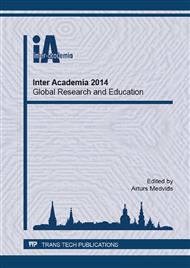p.249
p.254
p.261
p.265
p.269
p.273
p.277
p.283
p.287
Anytime Fuzzy Supervisory System for Signal Auto-Healing
Abstract:
This paper proposes a novel anytime fuzzy supervisory expert system for online signal processing. We demonstrate via simulations that this system is able to follow slowly varying signals and heal the signal in case of missing input data. In the presence of contaminating noise, the supervisory system performs the automatic wavelet shrinkage procedure selection, which ensures to pick the proper algorithm that is the most efficient in the given scenario. The necessary level of wavelet decomposition is determined online by the fuzzy supervisory expert. The system applies orthogonal wavelet functions in order to reduce significantly the processing time of reconstruction. The paper also shows how the online threshold estimator selection module ensures the highest denoising efficiency by selecting the most suitable algorithm.
Info:
Periodical:
Pages:
269-272
DOI:
Citation:
Online since:
July 2015
Price:
Сopyright:
© 2015 Trans Tech Publications Ltd. All Rights Reserved
Share:
Citation:


